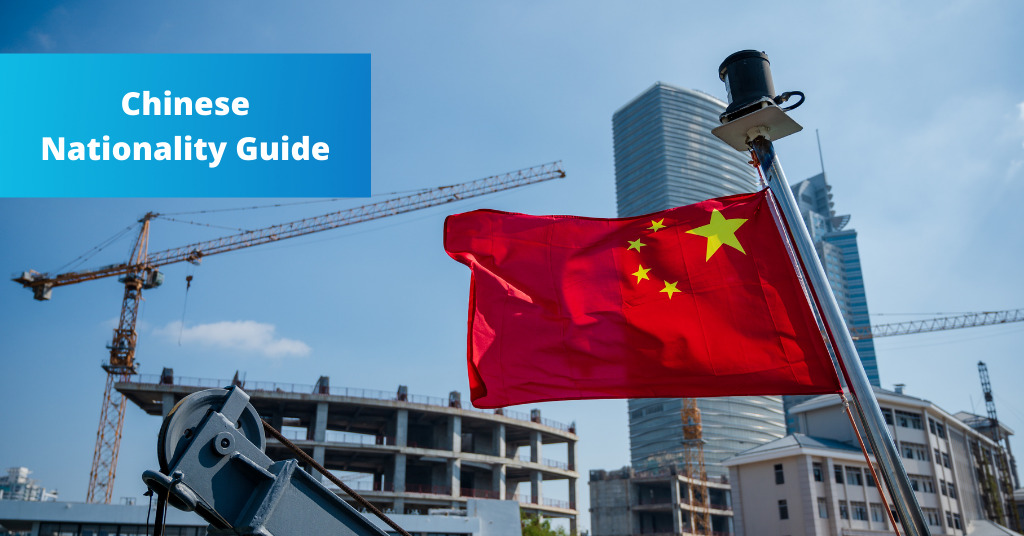
Chinese Nationality/Citizenship
Table of Contents
China’s Nationality Law, which was adopted by the National People’s Congress and went into effect on September 10, 1980, outlines the ins and outs of Chinese citizenship. The Chinese nationality law contains 18 articles that explain how to acquire Chinese nationality in general.
If you are interested in getting permanent residence in China and are interested to know about Chinese nationality or citizenship, you are already at the right place. Just continue to read!
Chinese nationality law
The Chinese Law governs the acquisition, loss, and restoration of the People’s Republic of China’s nationality. The People’s Republic of China is a unitary multinational state; persons belonging to China’s nationalities have Chinese nationality.
Dual nationality is not recognized by the People’s Republic of China or the Chinese government for any Chinese national. According to the Chinese Nationality Law, Any person born in China to parents who are both Chinese nationals or one of whom is a Chinese national has Chinese nationality.
Any person born in some foreign country whose parents are both Chinese nationals or one whose parents are Chinese nationals is granted Chinese nationality. However, a person whose parents are both Chinese nationals and have settled abroad, or whose parents are both Chinese nationals and have settled abroad, and who has acquired foreign nationality at birth, shall not have Chinese nationality.
Any person born in China with stateless parents or of uncertain nationality and has settled in China is entitled to Chinese nationality. Foreign nationals or stateless people who are ready to comply with China’s Constitution and laws and meet one of the following criteria may be naturalized if their applications are approved:
- They are Chinese nationals’ close relatives; they have established in China, or
- They have other valid or legitimate reasons.
Anyone who applies for naturalization as a Chinese national will gain Chinese nationality upon approval of his application. Anyone whose application for naturalization as a Chinese citizen has been approved will not maintain foreign nationality. Those that naturalize must renounce Chinese nationality or restore Chinese nationality.
A Chinese native who has settled abroad and has been naturalized as a foreign national or gained foreign nationality of his own volition shall automatically lose Chinese nationality. Anyone who files for renunciation of Chinese nationality will lose Chinese nationality if his application is approved. State functionaries and military personnel on active duty are not permitted to relinquish their Chinese nationality.
Foreign Citizens
Foreign citizens who formerly possessed Chinese nationality may seek restoration of Chinese nationality provided they have reasonable reasons; individuals whose petitions for restoration of Chinese nationality have been authorized shall no longer hold foreign nationality.
Except for the conditions specified in Article 9, individuals who desire to obtain, renounce, or regain Chinese nationality must undergo the application process. Persons under 18 may have their applications filed on their behalf by their parents or other legal agents.
Nationality applications at home will be processed by the public security bureaus of the municipalities or counties where the applicants live. In contrast, applications abroad will be handled by China’s diplomatic representation agencies and consular posts.
Applications for naturalization as Chinese citizens and renunciation or restoration of Chinese nationality are subject to review and approval by the People’s Republic of China’s Ministry of Public Security. Any person whose application has been approved by the Ministry of Public Security will be issued a certificate.
Before enacting this Law, the nationality status of persons who earned or lost Chinese nationality was preserved. This Law shall take effect on the day of its promulgation.
Citizenship by Birth
Chinese nationality law is mostly based on jus sanguinis (“right of blood”). Most Chinese nationals were granted PRC citizenship. In principle, if a person is born in China, they are Chinese citizens if at least one parent is Chinese. Both parents are settled in China and are stateless or of “uncertain” nationality.
A person who retains foreign nationality or is born abroad with at least one Chinese citizen parent has Chinese citizenship if that parent has not “settled” in another nation. The phrase “settled” usually refers to the Chinese citizen’s parent’s permanent residency in the country in question—a person born outside of China, including those with a Chinese parent(s).
Dual citizenship in China
The notion of jus sanguinis underpins Chinese citizenship (right of blood). China does not recognize dual nationality. However, it is possible to obtain Chinese dual citizenship in extremely limited circumstances.
For example, a person born in China to one Chinese parent and one non-Chinese parent holds Chinese citizenship and may gain another from the other parent.
Also, someone could be born overseas to at least one Chinese parent who does not live abroad and so receive Chinese citizenship from the Chinese parent and another citizenship in the country of birth through jus soli (right of the land).
Despite the importance of Chinese ethnicity to the authorities in the People’s Republic of China, efforts to engage with the Chinese diaspora do not include forging links through dual nationality.
In reality, China does not even allow its emigrants to retain Chinese nationality if they naturalize in another country. In practice, however, this is often of little consequence because China’s laws do not bind other nations, which can go ahead and award Chinese immigrants nationality.
Requirements and Procedures
Without going into specifics, the MPS states the “application requirements” for regaining Chinese nationality as follows: “foreign nationals who had possessed Chinese nationality may apply to restore their Chinese nationality on legitimate grounds” (China n.d.).
The “processing procedures” are as follows:
Fill out the Application for Chinese Nationality Restoration and submit a written application for Chinese nationality restoration. Also, make sure you have submitted applicable documentation.
Furthermore, the MPS mentions the following application documents: A photocopy of the foreign passport is required. A photocopy of the foreign national’s Permanent Resident Card is required.
Documents proving former Chinese nationality; Other materials are deemed necessary by the processing authority to apply for nationality restoration.
Duration of Processing
There is no set amount of days for processing applications to reclaim citizenship. While not particular to reacquiring citizenship petitions, the China-based English media website Global Times claims that it will take months for the bureau to decide on the approval of citizenship applications in general.
Within the time limits of this Response, no more information on the length of processing applications could be located among the sources considered by the Research Directorate.
Conclusion
The law permits renunciation of Chinese citizenship upon fulfilling at least one of certain requirements. The requirements are: the person is a near relative of a foreign national. The person has already settled abroad. Moreover, they have other legitimate reasons. State functionaries and military personnel are not permitted to renounce citizenship in China.
